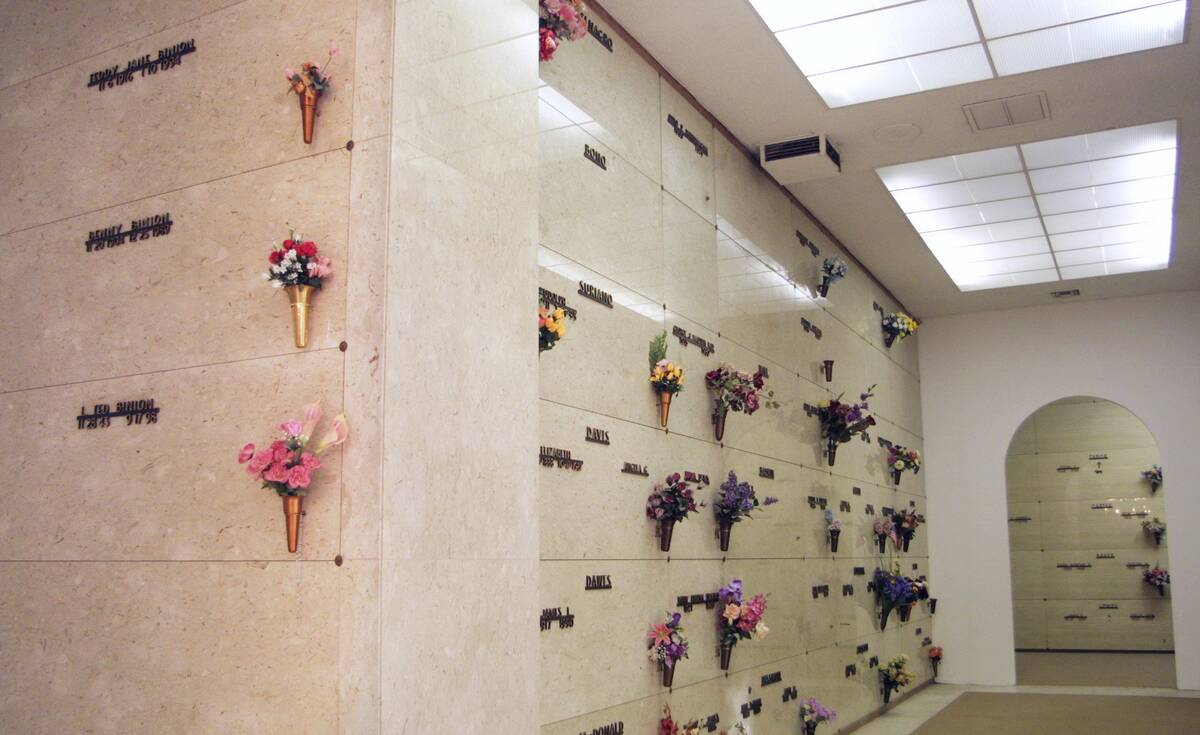Clark County covers burial costs for more than 2K people each year

It’s been a busy time for one Las Vegas mortuary that accepts the bodies of indigent people for cremation services paid for by Clark County.
“We’ve had 104 this month,” said Lori Siuba, manager of family funerals for La Paloma Funeral Services in Summerlin. “We get five or more cases a day. Probably over 1,000 a year.”
La Paloma is one of several mortuaries in the Las Vegas Valley under contract with Clark County to cremate and temporarily store the ashes of those who die within the county’s borders without funds for final expenses or family members with means to cover the costs.
In La Paloma’s case, cremation is the only method used. Casket burials of the indigent are unusual because the county will only subsidize cremations unless the person is of a religion that prohibits it, for instance, the Jewish faith, Siuba said.
“A lot have no next of kin” after they die, Siuba said. “A lot are adult children who die and they (family members) don’t have the funds.”
It’s part of a sad reality. Thousands of people die in Clark County each year without funds available to pay for disposal of their bodies and the county can’t locate family members who might be able to do so.
The county has its own repository — called the “county crypt” — of unclaimed cremains inside urns, stored within unmarked vaults at the Chapel of Eternal Peace mausoleum at the Bunker’s Eden Vale Memorial Park, 1216 Las Vegas Blvd. North, according to Serena Moore, an assistant manager with Clark County Social Services.
The number of cases of people who require public resources to dispose of their remains has declined somewhat since the end of the COVID pandemic, said Moore, one of five county employees who handle such arrangements.
The 2,110 referrals for taxpayer-funded arrangements the county received in 2023 was fewer than the 2,307 in 2022, Moore said.
The county’s budget to pay for the cremation and burial of indigents is set at $1.69 million for the 2025 fiscal year, Moore said.
On average, about 37 people are buried in caskets and the rest are cremated on a given year, according to Moore.
Most of the deceased the county deals with are those who have died alone with no relatives to claim their remains, Moore said.
“The majority of our cases are referrals with no identified loved one or next of kin,” Moore said.
To handle cremations of adults and children, contracted mortuaries are paid $775 for each cremation, $1,827 for full body adult burials, $507 for infant burials and $50 for body bags, Moore said.
For the remains of eligible military veterans, the county works with the Southern Nevada Veterans Memorial Cemetery in Boulder City, covering the costs aside from a $450 fee charged to the veteran’s spouse to open and close the interment site, according to records provided by Moore.
The county generally discontinued casket burials in 2014, aside from the occasional ones in cloth-covered wooden coffins, for members of faith-based organizations that prohibit cremation, mostly observant Jews, Moore said.
Attempts are made to find relatives
In situations where bodies are not claimed immediately by a next of kin, the Clark County coroner’s office attempts to locate the family by multiple means, including reviewing identification cards, medical records, online databases, digital phones, vehicles and online forums, according to Moore.
Other cases occur when a next of kin is known, but the deceased was the other half of a two-income household and the surviving spouse or relative is “not able to afford (their) after-life care,” Moore said.
To be eligible, survivors who can’t pay must show they have less than $2,000 available to spend or under $3,000 for a household of two, according to Moore.
Further, to qualify for the subsidy, the deceased had to have been a county resident with a household income at or below 180 percent of the federal poverty level set as of 2005, Moore said.
By Nevada law, unclaimed cremains must be held in storage by the contracted mortuary for up to two years, giving relatives time to find out if their loved one had died and file a claim with the county for the release of them, according to Yazmin Beltran, a county spokeswoman.
Unclaimed cremains
Those whose cremains are not claimed may be removed from the urns holding them and the cremains then scattered somewhere by representatives of the mortuaries, according to the county law.
The process from when the mortuary receives the body of an indigent person to cremation or burial takes about four to six weeks, Siuba said.
La Paloma has a shelf “four deep” with a couple of hundred standard ash-filled urns, which consist of square boxes made of sturdy hard plastic, Siuba said.
About half of the cremains at La Paloma go unclaimed after the two years, when the ashes may be removed for disposal, Siuba said.
The mortuary has a local pastor drive the urns, about once every three months, to a remote place on land he owns in southern Utah where he says a prayer and spreads the ashes onto the ground, Siuba said.
“He went last week for a run and did the scattering of over 50,” she said.
Based on a brief view, with an escort, of the county crypt inside the Bunker’s Eden Vale Chapel of Eternal Peace indoor mausoleum, a Review-Journal reporter was shown blank stone slabs fronting a few long vaults, situated above the crypts of Harry James, a famous 1940s Big Band leader who died in 1983, and Guy McAfee, who founded the Golden Nugget casino in the 1940s and passed away in 1960.